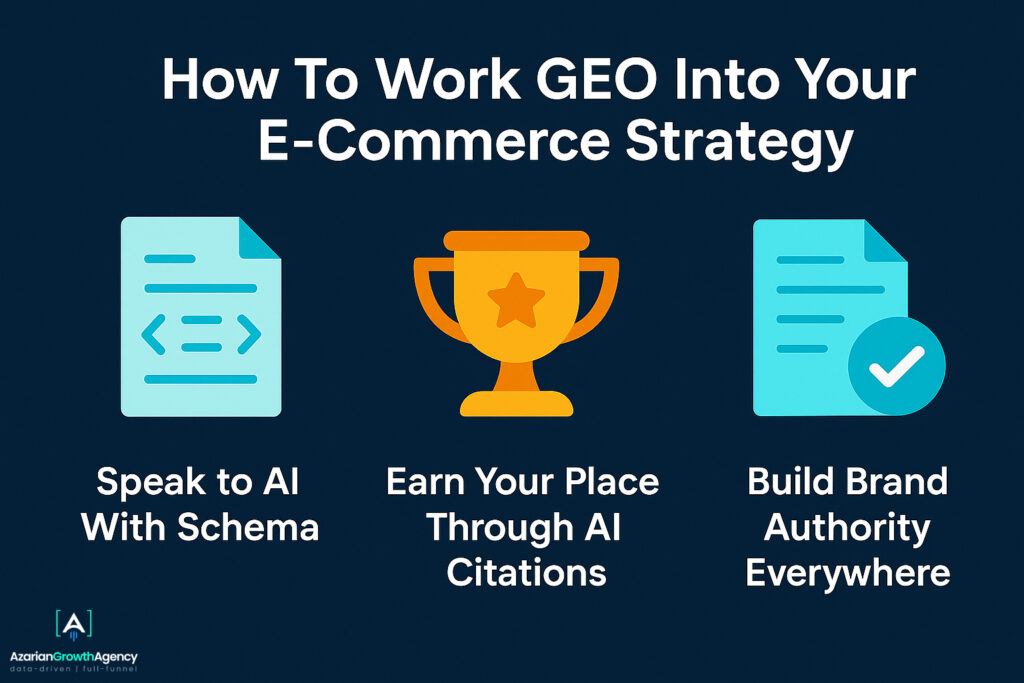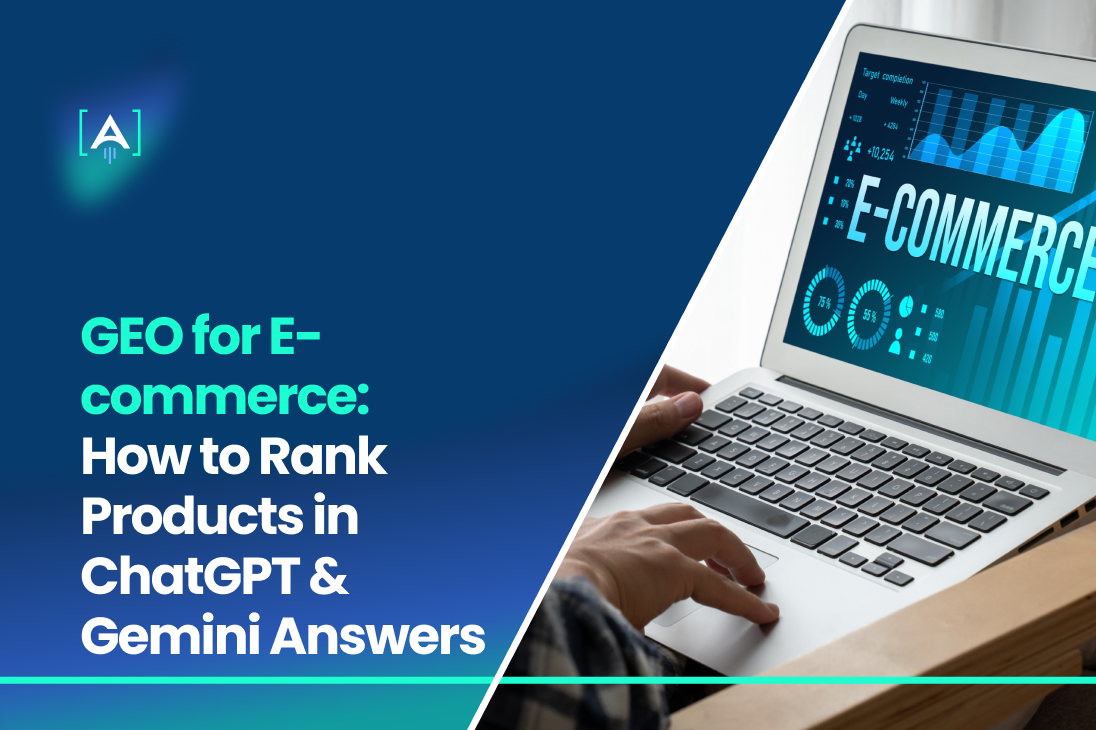GEO for e-commerce has become the direct route for online stores to get discovered inside ChatGPT, Claude, Gemini, and other generative AI engines.
Instead of scrolling through search results, customers now ask engines to recommend, compare, and even select products for them. If your store is not optimized for these answers, you are invisible.
Search has changed shape. SEO used to focus on keywords, backlinks, and rankings. GEO, or Generative Engine Optimization, focuses on visibility in AI answers.
The difference may look small, but in practice, it reshapes how people discover products and how businesses must present them.
Looking forward, e-commerce brands are learning how to adapt. The shift demands new workflows, new tools, and a clear understanding of how generative engines select what to cite.
Expert guidance of a GEO agency becomes essential at this stage, particularly for leaders who cannot afford trial and error.
So, in this article, we will explore more about the topic to improve our AI skills.
GEO for E-Commerce Explained in Plain Language
Generative Engine Optimization is the process of preparing your content so that AI systems can easily read, understand, and present it in their answers.
When someone asks ChatGPT or Gemini to list the “best skincare products under $30,” the engine does not guess. It scans structured content, evaluates authority, and pulls in the most relevant answers.
For e-commerce, this means that product descriptions, brand pages, and even blog content must be built for machines as much as for humans.
GEO vs SEO is not a choice between two strategies. It is a shift from search-based visibility to answer-based visibility. SEO helped you rank. GEO helps you appear directly in the answer box.
At the core of GEO lies brand authority and AI citations. Authority signals make your brand trusted. Citations are how engines give credit when your content powers their response. Without both, you cannot expect lasting visibility.
The New SEO: Why GEO Matters More Than Ever
Customers Are Shopping Inside AI Answers
A growing number of buyers do not open Google at all. They ask AI directly.
Queries like “what are the top noise-cancelling headphones” no longer return links but lists of products inside the chat. If your store’s content is missing from these lists, your brand disappears from the customer journey before it even begins.
This is where a zero-click content strategy comes in. Customers find the product details without leaving the engine.
From SEO to GEO: A Strategic Leap
Traditional SEO optimized titles, meta descriptions, and keywords for human searchers. GEO requires writing for AI. That means building content that engines can parse, structure, and cite. AI schema markup becomes the connective tissue. It tells the system what your product is, what it costs, what features it has, and why it fits a query.
In SEO, metadata influenced rankings. In GEO, structured context influences answers.
Overall, AI has reached new statistical records worldwide. By 2025, the market size of artificial intelligence is forecasted to climb to US$244.22 billion.
How to Work GEO into Your E-Commerce Strategy

Speak to AI With Schema
AI schema markup is not just technical decoration. It is the language of product data for machines. A clear schema tells engines your product category, attributes, and variations. If your sneakers come in multiple sizes and colors, schema markup ensures AI can present them accurately in its response.
Earn Your Place Through AI Citations
Generative engines often highlight where their information comes from. Being cited means your content was trusted enough to inform the answer. The way you write product pages, category descriptions, and supporting content directly affects your chance of citation.
Use clean language, complete details, and structured layouts. Citations then boost brand authority in the eyes of both AI and users.
Build Brand Authority Everywhere
Authority is not built overnight. Engines measure it through consistency.
- Are your products described the same way across your site, marketplaces, and content?
- Do external sources mention your brand?
- Do you provide expert-level insights?
Every mention adds weight. When AI must choose between two similar products, it often favors the brand with higher authority signals.
Tools That Make GEO Easier
The good news is you do not have to guess. GEO tools are emerging to track how visible your products are in generative engines.
Some check schema implementation, others analyze how often your brand appears in AI responses. Basic tools like schema validators ensure your markup is readable. More advanced GEO platforms monitor performance across engines.
The practical workflow looks like this:
- You research what customers ask about generative AI engines
- You adapt your product descriptions to answer those queries
- You validate your structured data
- You track whether your store appears in AI-generated lists.
- Over time, you refine and expand.
Avoiding Classic GEO Mistakes
Too many brands try to apply old SEO habits to GEO. The results fall short.
- Stuffing keywords still does not work. Writing for AI means context-rich clarity, not repetition.
- Leaving answers incomplete is another mistake if your product page does not answer the who, what, when, where, and why, AI will skip you.
- Many stores implement schemas incorrectly or only partially. Engines need clean, full data to use it.
- Few brands monitor AI citations, missing the chance to measure authority growth.
Learning from these errors saves time and resources. GEO is precise work, not guesswork.
The Future Is Answer-Based Shopping
It is not far-fetched to imagine that within a few years, most online shopping queries will happen directly inside generative engines. GEO is the new SEO because engines, not search pages, are becoming the main filters between buyers and products.
Generative AI engines will soon connect even deeper with e-commerce flows. Imagine customers adding products directly to carts from ChatGPT answers. Early adopters of GEO will already be positioned in those answers, while late movers will struggle to catch up.
This is not only about adapting to algorithms. It is about protecting and growing brand authority in the age of generative AI. Businesses that take GEO seriously today will own visibility tomorrow.
Closing Thoughts
GEO for e-commerce gives you a seat at the table when customers are making choices inside ChatGPT and Gemini. It serves as the bridge from the product page to the AI answer.
Without it, even the best products can remain unseen. With it, brands build authority, earn citations, and secure a lasting presence where buying decisions now begin.
The best time to make this shift is now. Waiting means leaving visibility and sales on the table.
The smart move is to work with growth-focused experts who can guide you through GEO workflows and make sure your store is always in the answer box. Choose wisely and grow with the trends.

